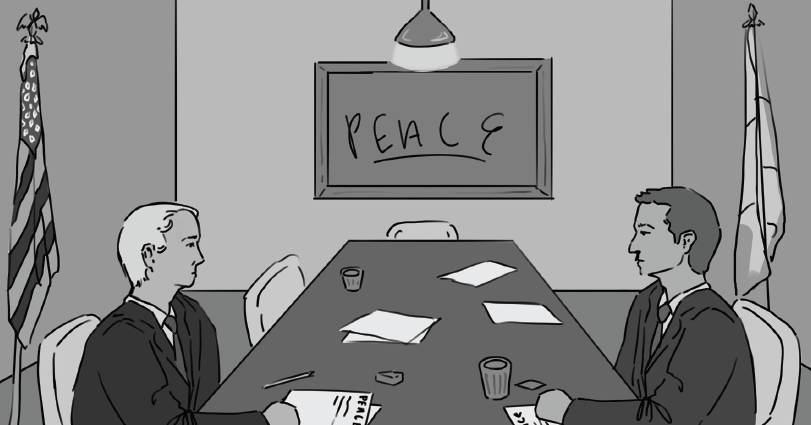Oct. 7th has dethroned Feb. 24th. Since Hamas’ brutal attack upon Israel, it is news about Israel that has been grabbing attention — not Ukraine, relegated to yesterday’s paper. This waning interest is understandable for a war that the Chief of the Ukrainian General Staff recently described as a “stalemate” in a November interview with The Economist. Just six months ago, flashy headlines were being run by major Western newspapers about Ukraine’s upcoming counteroffensive. Ukraine and parts of the Western media were adamant that Ukraine would retake Crimea — effectively ending the conflict by restoring Ukraine’s 1991 borders.
The grim fact for Ukraine is that they are unlikely to get media attention or the massive levels of Western military and economic aid that have enabled them to remain a viable combatant against a determined and relentless Russian state. A Ukrainian force with the offensive military capabilities of the one deployed this summer is unlikely to be constructed again, due to exhausted Western stockpiles — and waning enthusiasm from North Atlantic Treaty Organization (NATO) states.
Perhaps the best indicator of this is Ukrainian access to artillery shells, the workhorses of combat in this conflict. The U.S. already is having to split deliveries for artillery shells between Israel and Ukraine, an effective admission that there are not enough for both. A September article in Business Insider reported that Russian manufacturers produced seven times more shells than the West. If the West doesn’t have the capacity to provide the Ukrainian military’s most basic need, as a litany of Ukrainian officials have publicly stated thus far, increasing production of far more advanced systems to give the Ukrainians another strike package is out of the question.
This is not a question of Western might, but rather one of Western will. The West has massive latent economic resources, which could be converted into heavy industry to fully supply the Ukrainians. But this would be enormously costly. Western manufacturers may be the most technologically advanced, but they lack sheer numbers of workers and machine tools to gear up. To solve this problem, Western countries would have to do what Russia already has done: shift to a wartime economy and increase arms production. Russia certainly is taking attrition in its forces, but Russia continues to invest heavily in rearming, while Ukraine’s NATO suppliers have not.
This is an impossible choice for NATO leadership. While many voters may hang a blue-and-yellow flag on a bulletin board or say they care about Ukraine, there is not really the political willpower or enthusiasm to invest meaningful tax dollars away from local needs in their home economies. The supposedly limitless support of the Ukrainians seen at the outbreak of the war has become increasingly politically untenable, as seen most recently in the U.S. where factions of the Republican Party have blocked further aid. The switch to a wartime economy would be an enormously expensive task, when skilled workers and machine tools are already in short supply, and would be highly unpopular among a population that is already divided. More importantly, gearing up at this scale would be tantamount to declaring war on Russia. It is much easier to just continue giving trickling deliveries of haphazard systems to Ukraine, instead.
The current subscale support will likely keep the Ukrainian military alive as a defensive entity, but not as one with the capacity to retake territory — or to put an end to the conflict. Provided that the Russian State does not implode (a premise unlikely given that the Putin government has managed to withstand both Western sanctions and the Wagner Coup) there is no chance of a Russian surrender. Putin has too much riding on Russian victory in Ukraine.
Russia has made it clear it has committed to winning this conflict, as evidenced by the extensive popular and economic mobilization across the Russian nation. For Russian leadership, the conflict is viewed as existential: victory is not just desired, but is seen as both a birthright and as necessary to its very survival. As Russia increases its military production and conscription, and Ukraine sees waning Western support, the likely, heartbreaking outcome is that Russia will slowly grind down Ukraine shell by shell. The longer this conflict goes on, the more Ukrainians die, the more territory they will lose and the more damage their economy and state will sustain.
To be blunt, it would be pertinent for the West to own up to its limited willingness to support Ukraine on its mission and to encourage Kyiv to the negotiating table. Whether Russia will accept terms from the West about freezing the conflict is a different question, but the “red line” stance of refusing to negotiate with the Russians needs to be overcome by NATO leadership. Otherwise, there will reach a point where there will be no real Western-aligned Ukraine to support, an eventuality that will be both a devastating humanitarian tragedy and an unnecessary strategic loss for the West.































